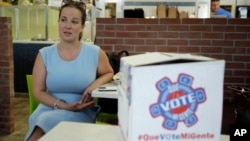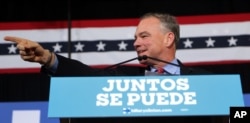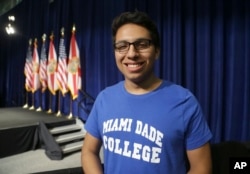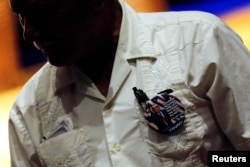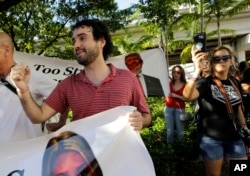Hispanic leaders say the Latino vote could make the difference in Tuesday's face off between presidential rivals Democrat Hillary Clinton and Republican Donald Trump, potentially swaying such such key states as Nevada, Arizona and Florida.
Clinton holds a lead of nearly 50 points among Hispanics nationally, and a 30-point lead in Florida, where Cuban-Americans favor Trump by a thin margin. But Puerto Ricans favor Clinton, giving the Democrat a solid lead among Hispanics in the state overall.
Democrats are targeting Hispanics through get-out-the-vote drives, hoping to motivate a diverse group of immigrants that often underperforms in national elections, despite its growing numbers.
Democratic vice presidential candidate Tim Kaine took his appeal to Arizona Thursday, where he delivered a Spanish-language speech, telling listeners, "you make our nation stronger, smarter, and more creative."
Kaine learned fluent Spanish while serving in his youth as a Catholic missionary in Honduras.
The Republican National Committee released Spanish broadcast ads on Wednesday urging Hispanics to vote Republican, without Donald Trump by name, while the Democrats released ads with Puerto Rican actor Jimmy Smits speaking Spanish, urging a vote for Clinton.
Another group supporting Clinton, the activist organization People for the American Way, launched Spanish robocalls this week in Pennsylvania and other states with voices of respected Latinas, including the Chilean-American author Isabel Allende and actress Rita Moreno.
Latino influence
An estimated 27.3 million Latinos are eligible to vote, representing 12 percent of American voters. Their impact is potentially greatest in several key states in this election. They represent 22 percent of eligible voters in Arizona, 18 percent in Florida, and 17 percent in Nevada.
Hispanics have been registering in large numbers, notes Raphael Sonenshein of the Pat Brown Institute at California State University, Los Angeles, because they are angered by comments by Republican candidate Trump, who has spoken of rapists and criminals among undocumented migrants from Mexico.
Trump has called for a wall along the southern US border, a proposal that also angered many Hispanics.
Dueling campaign rhetoric
Trump told supporters in New Mexico on Monday that a Clinton presidency would let hundreds of millions of people cross the U.S. border, bringing crime in their wake. Clinton says that Trump's immigration plan, which includes widespread deportations, would "rip the country apart" and separate families.
Clinton is calling for comprehensive immigration reform that will deal with the millions of illegal immigrants.
"My proposal will keep families together," she says, ruling out mass deportations, "and it will include a path to citizenship." She promises to implement her plan during her first 100 days in office.
She said she would also fix the family visa backlog, protect the borders and national security, and "bring millions of hardworking people into the formal economy."
Campaign promises
Clinton promises to uphold programs enacted by President Barack Obama through executive orders called DACA and DAPA, which defer the deportation of those brought to the United States illegally as children, as well as undocumented parents of American citizens.
Trump says he will end both programs, as well as "catch-and-release," in which U.S. officials release suspected violators of immigration law as they await a hearing.
He has also said he would put an end to so-called sanctuary cities that refuse to cooperate with federal authorities on immigration enforcement. He said security and jobs are central to his platform, and he says he will put Americans first.
While Clinton enjoys an overwhelming lead among Hispanics, two in 10 Hispanics support Trump, according to a poll in late October by the Washington Post and Univision.
What matters most
Like other Americans, Latinos say that jobs and the economy are the most important issues, and the Republican candidate says his successful record in business appeals to immigrants.
Clinton's support among younger Hispanics is less than enthusiastic, according to a Pew Research Center poll last month.
Two-thirds of Hispanic millennials (aged 18-35), who back the Democrat say their support is more against Trump than for Clinton. Slightly more than half of Latinos as a whole say the same thing, so the get-out-the-vote drive, although important for both parties, is crucial for Democrats among Hispanics voters.




